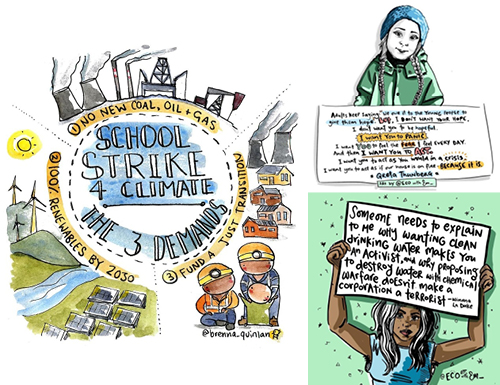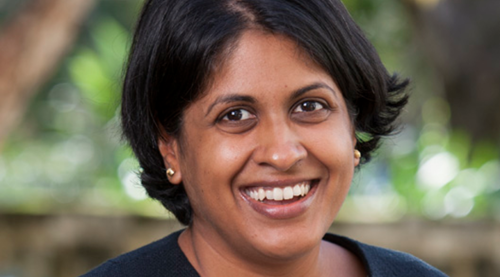Sajni Gudka writes about how climate change is forcing universities to educate and train their students differently, and encourages young people to demand the integration of climate science and action into their studies to be able to address future challenges.
In 2019, more than 1,000,000 school children across the world took part in the Global School Strike for Climate. Right here in Perth, 10,000 people gathered in Forrest Chase on that day.
They all skipped a day of school to rally against the climate and ecological crisis.
The Global School Strike for Climate kids demanded that all politicians and leaders must do everything necessary to create a healthy, habitable planet – urgently. They demanded that we must:
- Stop all new coal, oil or gas mining.
- Change all our energy use to renewable energy by the year 2030.
- Fund a just transition, by truly supporting everyone at every stage1.

Patient planet
I work in public health and so I find it easiest to write and speak in medical terms.
If someone you loved dearly was critically ill, you would understand why they need to rest, recover, and stop doing all things that make them worse.
Well, it is the same with our “Patient Planet”.
This extract written by researchers from the University of Southampton in England summarises how critically sick planet earth is.
“….if we were to consider our Planet as a Patient, as health professionals we would be seriously concerned about their health and would quickly diagnose that ‘Patient Planet’ was critically sick. A rapid assessment of the Planet’s Health would find an escalating fever with difficulties breathing, a faltering circulation with metabolic acidosis and a toxic status, failing liver and kidney functions, a pale and blotchy skin indicating signs of shock and a rapidly declining mental state. From the perspective of the Planet’s Doctor, we would urgently send ‘Patient Planet’ straight to Critical Care for emergency resuscitation and stabilisation.”
Yes, our planet is critically sick because of climate change and our activities on earth. “Patient Planet” needs to go straight to Critical Care, and we need to do everything necessary to urgently resuscitation and stabilise it. Just as urgently, we must stop all activities that harm our planet, such as burning of fossil fuels and cutting down forests.
Responsible climate action
For those of us working in health and medical related professions, we know that our work will be very challenging in the coming years.
Our changing climate means we will face many different public health emergencies. All over the world, we will get more infectious diseases, more heat stress, more mental illness, less food and water, and poorer nutrition.
Public health emergency COVID-19
In the COVID-19 public health emergency, health and medical staff in all countries are working under very stressful and difficult situations. It is an example of how a change in external circumstances calls for a change in how they practice and treat patients.
In Australia, there were months when we couldn’t get certain medicines, and hospital appointments were cancelled. To stop the infection from spreading, changes were made to the way worked e.g. the general practice doctors (more commonly known as GP’s) started doing telephone consultations instead of asking patients to come into the surgery.
It is for this reason, we need bold and courageous climate actions from all the different health sectors.
Recently, the West Australian Labor State Government committed to reducing the emissions and waste in our hospitals. It is a good start, but it is not enough.
The public health and medical schools also have a very important role to play in this. They need to teach their students the science of preventing further climate breakdown. They also need to prepare their student on dealing with all the different public health emergencies. A climate responsible public health and medical school would:
- Have real carbon emission reducing policies.
- Continuously work to improve (invest) in the health of the planet.
- Teach climate science in all courses as part of the main curriculum, and not as separate units.
- Stop supporting people and companies that harm the planet, such as coal, oil and gas companies.
- Encourage their students and staff to have open discussions about climate change.
Your future, your voice
Over the next few years, you may attend school, college or university Open Days. You may also attend formal interviews at these institutions.
No matter what you choose to study, be it engineering, business management, medicine, law, architecture, arts, history, social sciences, I encourage you to use your voice.
Ask you future place of study about their climate responsibility at the Open Days and your interviews. Ask them questions such as:
- What climate science do you teach in your courses?
- Are these climate science units part of the main course or are they separate units that are optional?
- Does your institution have an emissions target? What is it?
- What climate actions does the institution take to reduce emissions?
- What does your institution do to invest in a healthy planet?
- How do you encourage staff, students and researchers to use their scientific voice, and engage in climate science discussions?
- Is your institution involved with coal, oil or gas companies?
- If yes, have you considered withdrawing investment in research and support from these companies?
Their answers might help you decide whether or not you want to study there.
After all, responsible climate actions must be their ethical responsibility to you - so that you have a safe and healthy planet for your future.

Sajni Gudka is the Director of the Urban Impact Project, and an Adjunct Research Fellow at The University of Western Australia’s School of Population and Global Health. With over 10 years of experience in identifying, curating and evaluating scientific evidence, her work bridges academic research and public health policy. She strongly advocates for bold new approaches to policy and governance in the face of the climate and ecological crises.
1Images from permaculture illustrator Brenna Quinlan (https://www.brennaquinlan.com) and environmental writer and illustrator Eco with Em (https://www.ecowithem.com).
